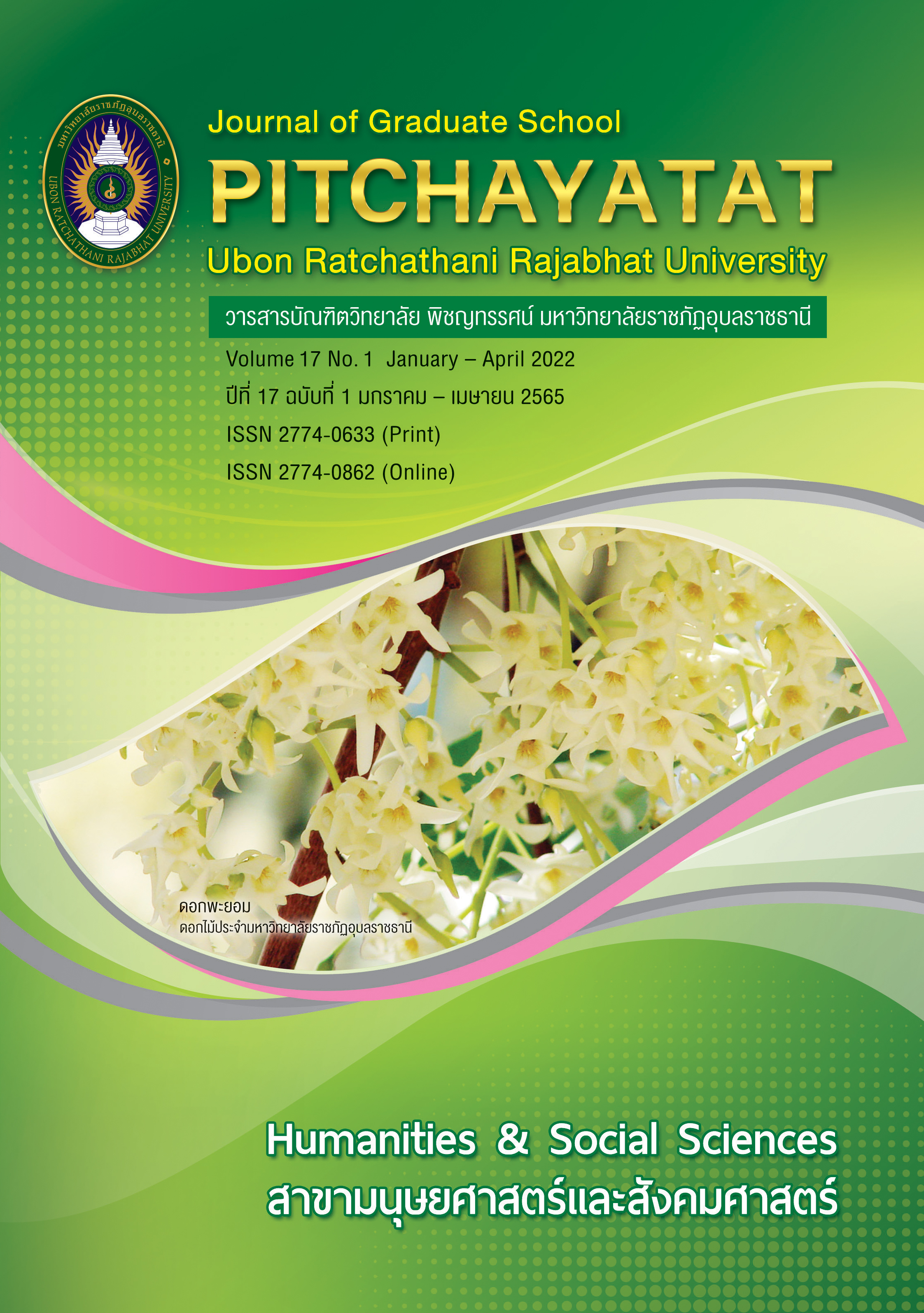การพัฒนาแบบวัดทักษะทางสังคม สำหรับนักเรียนชั้นมัธยมศึกษาปีที่ 3 สังกัดสำนักงานเขตพื้นที่การศึกษาประถมศึกษาอุบลราชธานี โดยใช้ทฤษฎีการตอบสนองข้อสอบแบบพหุวิภาค
คำสำคัญ:
ทักษะสังคม, วัยรุ่นตอนกลาง , ทฤษฎีการทดสอบแนวใหม่บทคัดย่อ
การวิจัยนี้มีวัตถุประสงค์เพื่อ 1) สร้างแบบวัดทักษะทางสังคม สำหรับนักเรียนชั้นมัธยมศึกษาปีที่ 3 โดยใช้ทฤษฎีการตอบสนองข้อสอบแบบพหุวิภาค 2) วิเคราะห์คุณภาพของแบบวัดทักษะทางสังคมสำหรับนักเรียนชั้นมัธยมศึกษาปีที่ 3 ตัวอย่างที่ใช้เป็นนักเรียนชั้นมัธยมศึกษาปีที่ 3 สังกัดสำนักงานเขตพื้นที่การศึกษาประถมศึกษาอุบลราชธานี ปีการศึกษา 2564 จำนวน 600 คน ได้มาโดยการสุ่มแบบชั้นภูมิ สถิติที่ใช้ในการวิเคราะห์คุณภาพแบบวัดตามทฤษฎีการทดสอบแบบดั้งเดิม ได้แก่ ความเที่ยงตรง ความเชื่อมั่น และอำนาจจำแนก สถิติที่ใช้ในการวิเคราะห์แบบวัดตามทฤษฎีการทดสอบแนวใหม่ ได้แก่ ตรวจสอบความตรงเชิงโครงสร้าง (CFA) ค่าพารามิเตอร์ความชันร่วม (α) และ ค่าพารามิเตอร์ Threshold (β) ของแต่ละรายการคําตอบ
ผลการวิจัยพบว่า
- แบบวัดทักษะทางสังคม มีคุณลักษณะ 4 ด้าน 20 ตัวบ่งชี้ย่อย
- คุณภาพของแบบวัดทักษะทางสังคมมีค่าความเที่ยงตรงทั้งฉบับ .90 มีค่าเชื่อมั่นทั้งฉบับ ตามวิธีการทดสอบแบบดั้งเดิม (CTT) โดยใช้วิธีการหาค่าสัมประสิทธิ์แอลฟาเท่ากับ .90 ที่ระดับนัยสำคัญ .05 การตรวจสอบความเป็นเอกมิติ ซึ่งเป็นเงื่อนไขในการใช้สถิติตามทฤษฎีการทดสอบแนวใหม่ (IRT) ด้วยวิธีการวิเคราะห์องค์ประกอบเชิงยืนยัน (CFA) โมเดลการวัดมีความสอดคล้องกับข้อมูลเชิงประจักษ์ ค่าไค-สแควร์ (χ2) เท่ากับ 162.22 (χ2 /df =1.18), ค่าองศาอิสระ (df) เท่ากับ 137 ค่านัยสำคัญทางสถิติ (p-value) เท่ากับ .06, ค่าดัชนีระดับความสอดคล้อง (GFI) เท่ากับ 0.99, ดัชนีวัดระดับความเหมาะสมเชิงเปรียบเทียบ (CFI) เท่ากับ 0.992,TLI เท่ากับ 0.988 ดัชนีรากของกำลังสองเฉลี่ยของเศษเหลือมาตรฐาน (SRMR) เท่ากับ 0.027 และค่าความคลาดเคลื่อนในการประมาณค่าพารามิเตอร์(RMSEA) เท่ากับ 0.18 วิเคราะห์โดยใช้ Graded-Response Model พิจารณาค่าพารามิเตอร์ threshold ของแต่ละรายการคำตอบ (β) พบว่า β1 มีค่าอยู่ระหว่าง -3.85 ถึง -1.74 ส่วน β2 มีค่าอยู่ระหว่าง -2.89 ถึง -.95 และ β3 มี ค่าอยู่ระหว่าง -1.60 ถึง -0.14 โดยข้อคำถามทุกข้อมีค่า β1 < β2 < β3 ค่าพารามิเตอร์ความชันร่วม (α) มีค่าอยู่ระหว่าง 0.58 ถึง 2.35
เอกสารอ้างอิง
ดุสิต ทีบุญมา, ไพศาส วรคำ และพงษ์ธร โพธิ์พูลศักดิ์. การสร้างแบบวัดทักษะชีวิตสำหรับนักเรียนในระดับชั้นมัธยมศึกษาปีที่ 6, มนุษยศาสตร์และสังคมศาสตร์. 7, 3 (กันยายน-ธันวาคม 2556): 137-146.
ธีระวุฒิ เอกะกุล. การวิจัยปฏิบัติการ. พิมพ์ครั้งที่ 9. อุบลราชธานี: ยงสวัสดิ์อินเตอร์, 2552.
พระราชบัญญัติการศึกษาแห่งชาติ แก้ไขเพิ่มเติมฉบับที่ 3 (2553). กรุงเทพฯ: สำนักราชกิจจานุเบกษา, 2553.
แผนพัฒนาเศรษฐกิจและสังคมแห่งชาติ ฉบับที่ 12. คณะกรรมการพัฒนาเศรษฐกิจ และสังคมแห่งชาติ สำนักนายกรัฐมนตรี. กรุงเทพฯ: สำนักงาน, 2559.
เลขาธิการสภาการศึกษา. แผนการศึกษาแห่งชาติ พ.ศ. 2560-2579. กรุงเทพฯ: สำนักงานเลขาธิการสภาการศึกษา, 2560.
จารุวรรณ เจนจบ. “ผลของโปรแกรมการส่งเสริมสมรรถนะแห่งตนต่อการรับรู้ สมรรถนะแห่งตนในการจัดการอารมณ์และพฤติกรรมการแสดงออกในวัยรุ่นตอนต้น,” การพยาบาลและสุขภาพ มหาวิทยาลัยนเรศวร. 8, 3 (กันยายน-เมษายน 2557): 15-17.
ชวลิต ศรีคำ. การพัฒนาแบบวัดสมรรถภาพทางสังคมของนักเรียนระดับมัธยมศึกษา. ปริญญาการศึกษามหาบัณฑิต สาขาวิชาการวัดผลการศึกษา มหาวิทยาลัยศรีนครินทรวิโรฒ, 2554.
พิชิต ฤทธิ์จรูญ. หลักการวัดและประเมินผลการศึกษา. กรุงเทพฯ: เฮ้า ออฟ เคอร์มิสท์, 2552
เพ็ญพิไล ฤทธาคณานนท์. พัฒนาการมนุษย์ (Human Development). กรุงเทพฯ: ธรรมดาเพรส จำกัด, 2549.
ล้วน สายยศ และอังคณา สายยศ. เทคนิคการวิจัยทางการศึกษา. พิมพ์ครั้งที่ 3. กรุงเทพฯ: สุจีริยาสาส์น, 2543.
วิชาการและมาตรฐานการศึกษา, สำนัก. แนวทางปฏิบัติการวัดและประเมินผลการเรียนรู้. กรุงเทพฯ: โรงพิมพ์ชุมนุมสหกรณ์การเกษตรแห่งประเทศไทย, 2552.
ศิริชัย กาญจนวาสี. ทฤษฎีการทดสอบแนวใหม่. พิมพ์ครั้งที่ 3. กรุงเทพฯ: โรงพิมพ์จุฬาลงกรณ์มหาวิทยาลัย, 2550.
สุขภาพจิต, กรม. คู่มือการจัดกิจกรรม “ฝึกคิดแก้ปัญหาพัฒนา EQ” (สำหรับศูนย์ใจเพื่อนวัยรุ่น). พิมพ์ครั้งที่ 3 นนทบุรี: กระทรวงศึกษาธิการ, 2540.
Bandura, A. Social foundations of thought and action: A social cognitive theory. Englewood Cliffs, NJ: Prentice-Hall, 1986.
Erikson, E. H. Insight and responsibility. New York: Norton, 1964.
ดาวน์โหลด
เผยแพร่แล้ว
รูปแบบการอ้างอิง
ฉบับ
ประเภทบทความ
สัญญาอนุญาต
ลิขสิทธิ์ (c) 2022 วารสารบัณฑิตวิทยาลัย พิชญทรรศน์ มหาวิทยาลัยราชภัฏอุบลราชธานี

อนุญาตภายใต้เงื่อนไข Creative Commons Attribution-NonCommercial-NoDerivatives 4.0 International License.
บทความทุกเรื่องได้รับการตรวจความถูกต้องทางวิชาการโดยผู้ทรงคุณวุฒิภายนอกอย่างน้อย 3 คน ความคิดเห็นในวารสารพิชญทรรศน์เป็นความคิดเห็นของผู้นิพนธ์มิใช่ความคิดเห็นของผู้จัดทำ จึงมิใช่ความรับผิดชอบของวารสารพิชญทรรศน์ และบทความในวารสารพิชญทรรศน์สงวนสิทธิ์ตามกฎหมายไทย การจะนำไปเผยแพร่ต้องได้รับอนุญาตเป็นลายลักษณ์อักษรจากกองบรรณาธิการ





